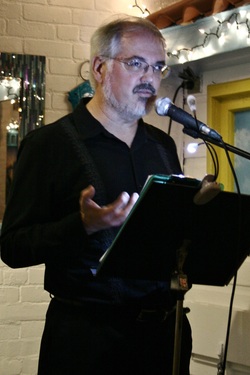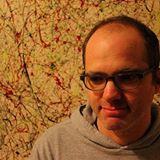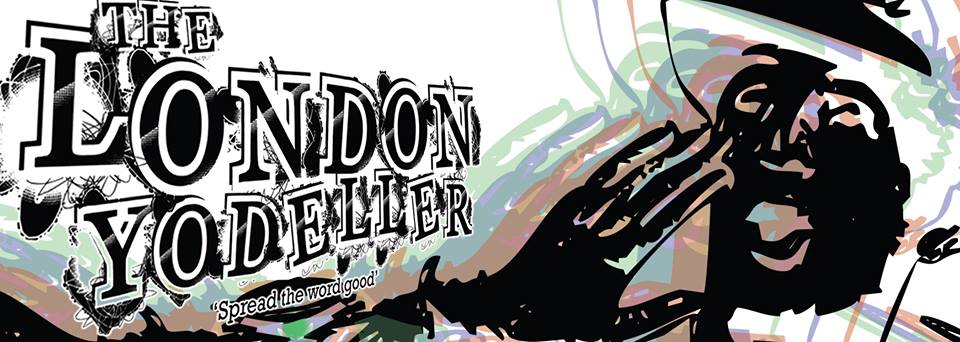
London Open Mic Poetry Night
Interview for The London Yodeller (Jan. 31, 2014 issue) by Jason Dickson, writer, novelist (three novels published to date), and bookseller at Attic Books.
J.D. What inspired you to start a reading series?
S.B. Shyness! That may sound contradictory, but it’s not. My wife and I sold our flower shop and moved to London in 2008. I decided it was finally time to do something about my shyness, which had caused me endless problems all my life. I had tried to deal with it before by going on extremely difficult adventures by myself, to toughen up, so to speak, but I eventually realized that did more harm than good. So now, being semi-retired and having more time, I started going in a social direction. I joined a poetry workshop, then tried to read my poems in front of others when I had the chance, which wasn’t easy, to say the least. Anyway, I accumulated a couple poetry friends and we went to an open mic reading in Sarnia. On the way home I wondered why they could have a monthly open mic in the town of Sarnia and there wasn’t one in London, which is so much larger. The answer was simply that someone had to organize it. My two friends didn’t have the time, And I thought there was no way I could do it because of my shyness. But then, on second thought, what the heck, if I don’t do something drastic now, at 61 years of age, I never will. So I took the bit between my teeth. How did it work out for me as therapy? Well, now, after our first one and a half seasons, I can get in the elevator in our building and CALMLY chat with people as we go up. For the first time in my life.
 Jason Dickson
Jason Dickson S.B. They’ve always been at Mykonos Restaurant. A local poet, Frank Beltrano, showed it to me as a possible venue. I had been searching through dingy bars and so on, and as soon as I saw this place I knew it was perfect. It couldn’t be improved upon. In good weather it’s a large square terrace open to the outside at the back. In winter it’s enclosed and well-heated. Beautiful Greek atmosphere. The tables hold up to 65. (We’ve been averaging about 45 lately.)
J.D. Tell me about the first night.
S.B. Well, that was extremely stressful for me because I had to host, not just organize it, as I do now. (Our current host, the very confident Dawna Perry, hadn’t joined us yet.) Anyway, I did manage to get through it. We opened with a half hour of music (Bernie Koenig on vibraphones and Emma Wise, cello--what a combination!), followed by Andreas Gripp doing a feature reading. Then a musical intermission, and after that the open mic. It went well.
J.D. How did you promote it? Was there a good attendance?
S.B. Well, I started out just Googling how to organize an open mic, then set up a website, then looked for poets to feature. I decided they had to have at least one book of poetry published. I think it was one of these poets who suggested I needed to have a Facebook page, so that was next, (and what a lot of work that turned out to be). Then I looked for all the places I could list the open mic for free, mostly online. Which I did. And finally made posters and put them around. I was surprised when 47 people turned up at the first event. For poetry, that’s a pretty good turnout, no matter how large your city is.
J.D. Why a published book? Why not a free-for-all?
S.B. Well yes, it could be a 100% open mic. That’s about as close as we could come to a free-for-all. And that is one kind of poetry event for sure. In a big city like Toronto you could get enough attendance with that. But here you would find that some poetry lovers and poets -- any percentage is too high in a small city -- would only come out if they felt sure there would be at least one reader there they could learn from. I mean many of us who love writing poems are amateurs, like me for instance, in the sense that we love to be creative with words, and are good enough at it that it pleases at least ourselves. But poetry is like any other art; There are the Picassos and Mozarts, and then there are us dabblers. By having a featured poet, followed by an open mic, we can at least partially satisfy most everyone. Anyway, when I started this thing, I just made up this simple rule: To be a featured poet you have to have published a book of poems. I didn’t realize then that it’s next to impossible for a poet, no matter how good, to get published by a commercial publisher these days. There are far too many poets and very little market. And, on top of that, suddenly the internet came and took a huge cut out of what little there was. So nearly all poets are self-published now. The problem with that is that anybody can be self-published. So now I can see that this doesn’t really work as a criterion. I and the people on our organizing committee have reluctantly had to become judges to some degree.
J.D. Tell me about some of your favourite moments so far. What has stood out for you?
S.B. Favourite moments? There are so many. There are poems I`ve heard, from both the featured poets and the open mic readers, that have astonished me. And you never know when it`s going to happen.
And all the poets are so different from each other. After a season and a half, I'm amazed at how different all these really good poets are from each other. And their poetry as well. Completely different. Well, it`s exactly the same with the open mic section, but much faster. Each person has five minutes. And you never know who`s getting up next. You just begin to get used to one poet`s character, clothes, look, reading style, and poetry, and then that person sits down and a totally different one gets up. It`s like that for an hour and a half. You don't even have to be into poetry to get a kick out of the variety. The thing is, in those few minutes you don't just see the person visually, as we do with most people we don't know, but from their poems you get a deep picture of their lives and who they really are inside, as well. I love it.
J.D. Where is the series now, in your opinion, now that it has been going on for a while? What are your plans for the future?
S.B. Now it’s beginning to fulfill one of its original purposes, which was not only to provide a place where local poets, and poets from the region, could read their work -- to fill that gap in the city -- but also to help form a community here. Due to the nature of the art, it’s easy for poets to find themselves working, and being, alone in their rooms. Thanks to our events, and our website, they’re at least starting to recognize each other. Some of them. They’re seeing each other’s abilities and styles. Some are being affected by others. Some are talking to others.
Earlier in the series, most featured readers would just read that once and you would never hear them again. But lately, more and more of them are coming back, sometimes to read at the open mic. And many really good poets who have never yet been featured are also becoming known and appreciated from their open mic readings. During the last few events, the open mic section has really begun to shine, to come into its own. It’s becoming very exciting, and more open. Maybe people are just relaxing and getting used to it, but I think part of it is a growing enthusiasm. Also new people are always showing up, eager to take part.
My latest idea is probably the best I’ve had personally. It’s a result of always being aware of probably the only little negative at poetry readings, which is that you only get to hear a poem once. You can’t go over it the way you can in a book, and really get deeply into it. I keep trying to solve that problem, and this idea is one attempt. It’s to get the city to stamp poems into the sidewalk when they make repairs with wet cement. If they did, it would expose poetry to a lot of people who would never get into it otherwise, including children on their way to and from school. The number of poetry readers and writers would go up instead of down as it has for so long. Well, I Googled it. One other person has had the same idea, and consequently St. Paul, Minnesota has been stamping poems into their sidewalks for five years now, totalling over 700 impressions. So I made an initial presentation to the London Arts Council before Christmas and they were very enthusiastic. They want me to present it to City Council as soon as I can get it together.
J.D. Tell me about Frank Davey's involvement.
S.B. I think it was Andreas Gripp who told me that Frank Davey was now living in Strathroy, part of our local territory. Frank is one of the most well-known and influential poets in Canada, considered to be THE poet who introduced post-modernism to the Canadian poetry scene. I asked him if he would consider being our headliner at our April National Poetry Month event. He agreed and we met for coffee to talk about it. Just as we were leaving the cafe it occurred to me that I had nothing to lose by asking if he would be interested in having a blog on our website. Well, It was a very lucky coincidence that right then he was in the midst of retiring from his lifetime work asf editor and publisher of his hugely influential critical literary journal Open Letter. And he hadn’t decided where to go from there. I told him I would support his blog to the utmost of my abilities, so he went for it. That blog has become a huge part of our website. About half of our readers come because of it. Anyway, Frank didn’t stop there. He has come and read at our open mic, and even joined our organizing committee. And one of our big ideas still sitting in the background came from him: the possibility of starting a publishing collective. Maybe, maybe not. If it did happen, it would be a separate thing from the open mic organization. We’re very slowly mulling it over.
J.D. Finally, what role do you see the series playing in town? Where does it fit with, say Poetry London or the literary efforts at U.W.O.?
S.B. Without us, there is a huge poetry gap in the city. Poetry London, which I attend nearly every month and really enjoy, mostly brings in poets from elsewhere. It does a lot for the poetry audience here, but little for the poets. Likewise, the literary efforts at UWO are fairly insulated from the rest of the community. But we are there for everyone. The poetry lovers and the poets of the whole city. And area. We want to bring everybody together, to be an event they can all own. This next event, on Feb. 5th, is our first attempt to really involve the UWO community. Instead of having one feature, we are having four, all senior poetry students. They will do at least three rounds of poems. In the first round their poems will all contain the same three lines, and will be written expressly for this event. It should be fun.

 RSS Feed
RSS Feed